Essential oils promote health and wellness. It is a form of alternative medicine that uses plant extracts and is helpful for Aromatherapy. Such oils are aromatic and volatile liquids obtained from plant materials by steam distillation and after the plant from which they come. Essential oils can be defined as products or mixtures of aromatic substances or as mixtures of aromatic and odorless substances.
Essential Oils Definition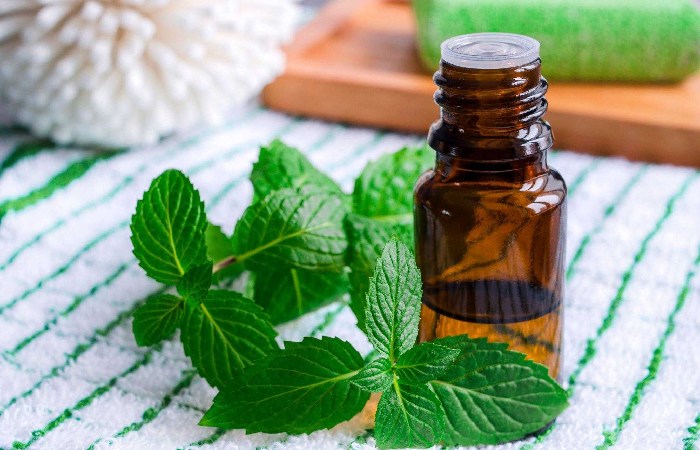
- Essential oil is a concentrated hydrophobic liquid that contains volatile chemical compounds from plants. It evaporates quickly at average temperatures.
- They are made by steaming various parts of a plant, like flowers, bark, leaves, or fruit, to capture the compound which produces fragrance. They preserve the natural smell and taste as they contain concentrated plant extracts
- It might take several pounds of a plant to produce just one bottle of such essential oil. In addition to creating a fragrance, essential oils perform other plant functions.
- Doctors use them in natural and alternative health practices, like Aromatherapy and naturopathy.
- Essential oils are liquid extracts of several potentially beneficial plants. Manufacturing processes can extract beneficial compounds from these plants.
- Essential oils often smell much stronger than the plants they come from and contain higher active ingredients.
- The plants themselves also use essential oils. Essential oils in plants help control infection, moisture, hormonal effects, and wound healing and attract or repel insects, birds, and animals.
- Essential oils are not greasy; they are oils because they contain the plant’s oil-soluble chemicals (usually 100-200 chemicals per crucial oil). This complex chemistry gives vital oils their therapeutic properties and explains why different essential oils can have overlapping effects.
- Essential oils come from parts of certain plants such as leaves, seeds, bark, roots, and bark.
- You should consult your doctor before using it and remember to check the label.
How to Use Essential Oils? Dos and Don’ts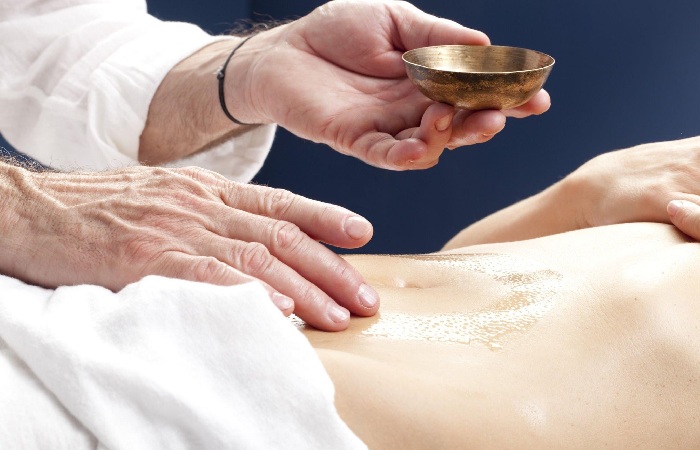
Are you eager to know how to use such oils? Here, we will make you understand clearly what to do and what not to perform to give you a positive result while using. Plants are of structural materials and phytochemicals. These chemicals have properties that benefit not only the plant but also people. A lot of plant material is required to make essential oils, and some can be expensive.
For instance:
About 250 pounds of the lavender flower makes 1 pound of lavender essential oil.
About 5,000 pounds of rose or lemon balm petals make 1 pound of rose or lemon balm essential oil.
Because so much of the plant is needed to produce essential oil, it is a potent botanical medicine.
Dos while using Essential Oils
Use Essential oils mildly if you are anxious about simple smells like lavender, chamomile, and rosewater that give you pleasure and keep you calm. Such aromas help you relax and take out the stress away.
Check the quality: The quality of oils on the market varies, from pure essential oils diluted with cheaper ingredients. And because there are no regulations, the label may not even list everything in the bottle you buy. Look for a reputable producer that makes pure oils with nothing added. You might probably have an allergic reaction to oils that contain other ingredients.
Throw away old oils – Oils over 3 years old can cause an allergic reaction. Check the date before use. Older oils are more susceptible to deterioration due to exposure to oxygen. If you notice a significant change in an oil’s look, feel, or smell, you should throw it away because it’s probably gone bad.
Ask your doctor: An allergic reaction can cause skin rashes, hives, or breathing problems. Therefore, it is always best to consult your doctor for advice.
Dilute them – Remember to dilute the oils in a suitable % with vegetable oils, bath gels, or creams. Mix them properly, as they may cause a reaction if not mixed properly.
Consider Age: Use only for people who can resist chemicals. For children, you need to dilute more because it could create serious problems. Always take the advice of a pediatrician before using it on children. Some oils, such as birch and wintergreen, should be avoided altogether.
Choose your therapist: If you’re looking for a professional aromatherapist, do your homework. By law, they don’t need to have any training or license.
Try them for infections: Take a chance and try fungal or bacterial infections with tea tree oil. It relieves the symptoms of a fungal infection of the feet.
Take extra care during pregnancy: some essential massage oils can reach the placenta, an organ in the uterus that grows with your baby and helps nourish it. It’s unclear if this causes any problems unless you take poisonous amounts. It is best to avoid certain oils if you’re pregnant rue, oak moss, Lavandula stoechas, wormwood, camphor, parsley seed, sage, and hyssop.
Don’ts while using Essential Oils
It will help if you remember how to use the oils precisely:
Don’t rub: Oils suitable for your arms and legs may not be safe to put in your mouth, nose, eyes, or private parts. And also Lemongrass, peppermint, and cinnamon bark are some examples. Just because it comes from a plant does not mean it’s safe to rub on your skin or inhale. Natural substances might be irritating, toxic, or cause allergic reactions. Like anything you put on your skin, it’s best to try a little on a small area and see how your skin reacts.
Don’t use it on the skin: Cumin oil, which is safe to use on your food, can cause blisters if you get it on your skin. Citrus oils, which are safe in your food, can harm your skin, especially if exposed to the sun. And the opposite is also true. Eucalyptus or clary sage oil can calm you down if you rub it on your skin or inhale it. But swallowing them can lead to severe complications, such as seizures. Injured or inflamed skin absorbs more oil and may cause adverse skin reactions. Undiluted oils, which you shouldn’t use, can be dangerous for damaged skin.
Don’t go for the wrong dose – They can be highly concentrated and cause serious health problems, mainly if used in the wrong amount or in the wrong way. Like anything, little hands shouldn’t be able to reach them, don’t make your essential oils too convenient. If you have children below 10 years, keep all essential oils locked up, out of their sight and reach.
Stop if your skin reacts: If you notice a rash like small bumps, boils, or just plain itchy skin, take a break. More of the same oil can make it worse. Whether you mix it yourself or it’s an ingredient in a ready-to-use cream, oil, or aromatherapy product, gently rinse it with water.
Please don’t overdo it: using too much or too often can cause a bad reaction. Therefore, opt for limited use even if you are not allergic or exceptionally sensitive.
Some essential oils can harm the liver and nervous system when used excessively. Tea trees and eucalyptus oil are also known to cause seizures. Be careful when using essential oils on kids, people with weakened immune systems, pregnant women, and the elderly.
Safest Ways to Use Essential Oils
Johns Hopkins discourages using essential oil diffusers, small appliances that generate fragrant mist. Transmission in a public space or a multi-member household can affect people differently. For example, peppermint is helpful for headaches. But if you use it for a child under 30 months, the child may become restless. It could have a negative effect. Also, a person with a rapid heartbeat may react negatively to peppermint.
Aromatherapy accessories: necklaces, bracelets, and keyrings made from absorbent materials that you apply and smell essential oils to throughout the day.
Body Oil: A blend of essential oils with a carrier oil, such as olive, jojoba oil, or coconut oil, is massaged into the skin. As essential oils are intense, they can irritate, so avoid using their full force on the skin.
Scent stick: Also called an essential oil inhaler, these portable plastic sticks have an absorbent wick that soaks up the essential oil. They come with a lid to keep the smell a secret until you’re ready. Put the essential oil blend in a small roll-on bottle for a more straightforward application.
Methods to Use Essential Oils
Aromatherapy – Diffusing essential oils is called Aromatherapy. Avoid direct contact with the essential oil. Dilute it first, regardless of which method of therapy you use. When you inhale, the oil’s aroma immediately stimulates your nervous system, triggering an emotional reply and rapidly changing your mood.
A magic diffuser disperses tiny oil particles all around the room so you can inhale them. Follow the instructions given on your diffuser for the correct oil-to-water ratio.
The Old Method – Breathe in the aroma deeply after opening the bottle.
Dry Evaporation – Try putting a few drops of essential oil on a cotton ball to smell the fragrance as it disperses.
Steam Inhalation – Also, place a few drops of oil in a bowl of hot water. Put your head above the bowl, put a towel on your head, and breathe in the steam.
Benefits of Essential Oils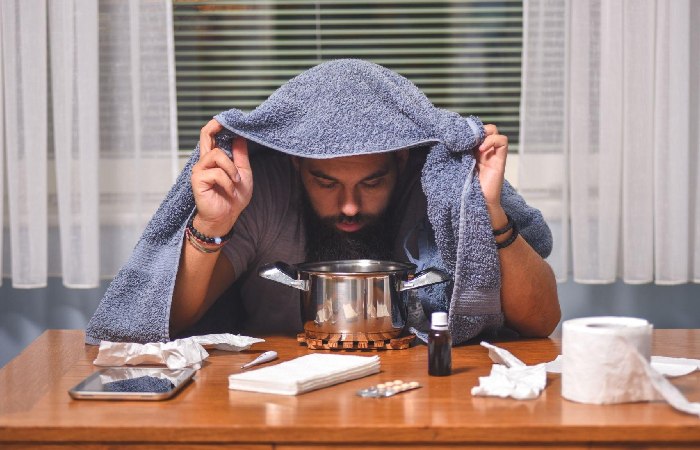
Essential oils are helpful in Aromatherapy, a complementary medicine that uses scent to improve health or can be applied topically to the skin.
Studies have shown that essential oils can help:
- Improve mood
- Improve work performance by reducing stress and increasing attention
- Improve sleep
- It kills bacteria, fungi, and viruses
- Reduce anxiety and pain
- Reduce inflammation
- Reduce nausea
- Relieve headaches
Common Essential Oils and Their Benefits
Lavender Oil
- Lavender is Dr. Lin’s favorite oil. It’s gentle and has a lot of benefits. You can use it in different ways.
- Try adding it to a diffuser for Aromatherapy, add it to water to make a room or body spray, or unite it with a carrier oil to make a body oil for your bath.
- Lavender can help with stress, pain, and sleep. “Before the discovery of antiseptics, lavender was helpful as a cleaning agent in hospitals,” says Dr. Lin.
- Studies have also shown that lavender oil potentially disrupts hormones in young children.
Tea Tree Oil
- Lin says that many people use tea tree oil as an antiseptic medicine, antimicrobial, or antifungal. You can also use it to help your Acne. Take a cotton swab and dip it in tea tree essential oil. Then apply it directly to the Acne—this is one exemption where you don’t have to dilute it. It can help Acne resolve faster.
- Athlete’s foot and ringworm – Dilute it with a carrier oil (a base or carrier oil like coconut or jojoba oil that helps dilute essential oils) and apply the mixture to the affected skin.
- One caveat: Do not disperse it if you have small children or pets.
Frankincense Oil
Known as the “king of oils,” frankincense help with inflammation, mood, and sleep. Studies have shown that it improves asthma and prevent gum disease.
Frankincense oil has a woody, spicy scent and can be helpful for Aromatherapy and skin creams. Be sure to dilute the oil before applying it to your skin. Dr. Lin adds Peppermint tea can also calm your stomach if you suffer from irritable bowel syndrome or gastric irritation. It’s very smooth and easy to use. When using the oil topically, be sure to dilute it.
Peppermint Oil
Being an anti-inflammatory, antifungal and antimicrobial
- Relieves headaches
- Fight fatigue
- Mood lifter
- Reduce intestinal spasms
- Promotes digestion
- Memory support
Eucalyptus Oil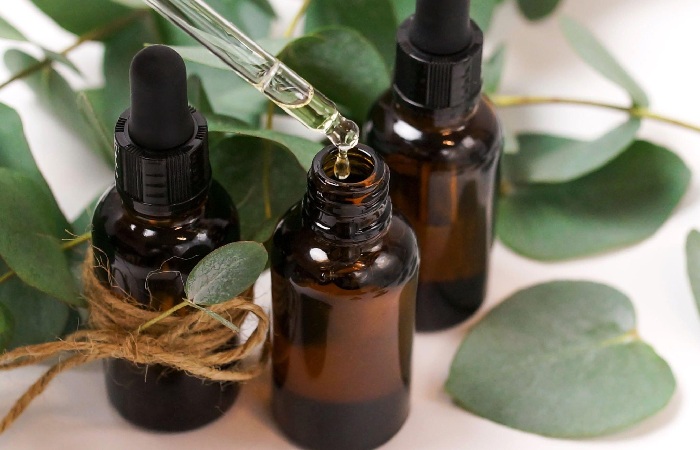
It is a great essential oil to have on hand during the cold season. It relieves nasal congestion by opening your nasal passages to breathe more easily. (Peppermint oil can also help with this.)
It can also relieve pain and fight the herpes simplex virus with its antimicrobial and anti-inflammatory properties.
Take precautions when using eucalyptus oil and dilute it before topical application. It can have dangerous side effects on children and pets.
Lemon Oil
Lemon oil extracted from the rind of lemons is to be diffused into the air or applied topically to the skin with carrier oil. A study also indicates that the Aromatherapy of essential oils such as lemon oil can improve cognitive function in people with Alzheimer’s.
Lemon oil is known for:
- Reduce anxiety and depression
- Reduces pain
- Relieves nausea
- Kills bacteria
It is safe for Aromatherapy and topical use. Avoid direct exposure to sunlight after use. It includes lemon, lime, orange, grapefruit, citronella, and bergamot oils.
Lemongrass Oil
It has a strong citrus scent to help relieve stress, anxiety, and depression.
Its antibacterial properties make it an excellent natural remedy for healing wounds and killing bacteria. It prevents the growth of fungi found in athlete’s foot, ringworm, and jock itch.
A study found that it can help reduce blood sugar in people with diabetes of type 2.
Be sure to use carrier oil before applying it to your skin.
Orange oil
Orange oil comes from the peels of citrus fruits. It can be diffused into the air, topically on the or even used as a natural cleanser at home. Besides, Orange oil has the prospective to make your skin more responsive to sunlight, so be careful using it on your skin.
Orange oil is known for:
- Kills bacteria
- Reduce anxiety
- Reduces pain
Rosemary Oil
You have probably opted for rosemary to add flavor to your favorite recipes. But there are additional benefits of using rosemary oil, such as humanizing brain function, promoting hair growth, reducing pain and stress, improving mood, and reducing joint inflammation.
Rosemary oil can be used safely in Aromatherapy and topically on the skin with carrier oil. If you are pregnant or suffering from epilepsy or high blood pressure, you should avoid using rosemary oil.
Bergamot Oil
What is bergamot? If you are a fan of Earl Gray tea, you have drunk bergamot. The oil, which has a fruity, floral scent, can be applied topically with a carrier oil (but may make skin sensitive to the sun).
Bergamot oil is known for:
- Reduce anxiety
- Mood elevator
- Low blood pressure
Cedar Oil
Cedarwood oil has antioxidant and antibacterial properties and is a popular ingredient in insect repellents, shampoos, and deodorants with its woodsy scent. But you can also use oil to help with sleep and anxiety. You can use cedarwood oil as an aromatherapy and a topical treatment mixed with a carrier oil.
The Risks of Essential Oils
Many people believe that as essential oils are natural products, they won’t cause any side effects. It’s not true. Possible side effects of such oils include:
- Irritation and Burning: Always dilute with a carrier oil before applying them to the skin. First, apply a small amount to a small skin area to check for any reaction.
- Asthma Attacks: Although essential oils are safe for most people, some people with asthma may react by inhaling the vapors.
- Headaches – Inhaling essential oils can help some people with headaches, but excessive inhalation can lead to headaches in others.
- Getting oils into the eyes or mucous membranes can also cause burns and damage the area. So, If essential oils get into the eyes, rinse thoroughly with water and seek medical attention.
- Keep out of reach of children and separate from other products. Some essential oils can be lethal to pets, even if a person uses them in a diffuser. Always research which oils are safe for pets or ask a veterinarian.
- While some consider them safe, many doctors advise pregnant women to avoid essential oils.
What Researchers Say About Essential Oils
Studies show that lavender and tea tree oil act as endocrine disruptors (EDCs), linked to various health issues.
Endocrine disruptors are substances found in the environment, food sources, personal care products, and manufactured goods that interfere with the normal functioning of your body’s endocrine system.
NIEHS scientists want to know about which chemicals exhibited hormonal activity that could lead to prepubertal gynecomastia.
Scientists applied pure lavender essential oil, tea tree oil, or eight of their chemical constituents to human cell lines in test tubes, called in vitro experiments.
Researchers tested pure lavender and tea tree essential oils and four chemicals commonly found in both: eucalyptol, 4-terpineol, dipentene/limonene, and alpha-terpineol.
The NIEHS team also studied linalyl acetate and linalool, specific to lavender oil, and alpha-terpinene and gamma-terpinene, clear to tea tree oil.
Based on an analysis of the chemical constituents of 93 essential oils, the 8 chemicals selected in the NIEHS study emerged as the most numerous, as shown in the list below. Each of the eight chemicals is listed below.
- dipentene/limonene – 90
- alpha-terpineol – 87
- linalool – 82
- 4-terpineol – 80
- eucalyptol – 79
- gamma-terpinene – 79
- alpha-terpinene – 77
- linalyl acetate – 62
The team described whether topical exposure to chemicals led to hormonal activity in the NIEHS study.
In 2019, a clinical case described abnormal breast growth in preadolescent girls continuously exposed to lavender-scented products. The premature breast growth resolved when the exposure to lavender-containing products was stopped.
The researchers want the public to be aware of the findings, as some essential oils and their constituents exhibit hormonal activity and could be potential endocrine disruptors.
Essential Oils Marketing Strategy
Essential oils are among the popular products that have increased in demand over the past decade. It is helpful in the health, cosmetics, and aromatherapy industry. In addition, there has been an increase in vegetable oils to replace synthetic fragrances and animal-derived components. Essential oils incorporate a wide range of consumers into a business and a market. So, tell us about marketing strategies to make your business a big success.
Market Trends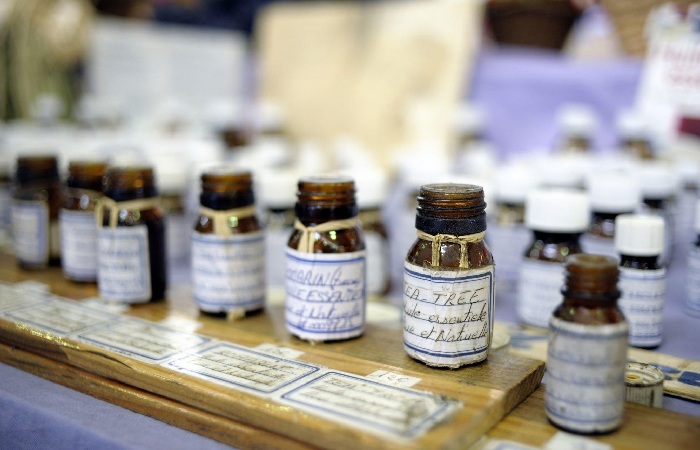
You need to identify essential oil market trends. The first step to conquering the oil market is to choose a niche and sell it to your target audience. We see a continual rollout of trends in essential oils, and the products help to enhance their benefits, whether in diffusers or Aromatherapy. Choose a niche and focus on a specific target audience.
Deciding which niche you want to invest in depends on the essential oils you plan to sell, your target audience, and where your brand will stand out from the competition. Here are some examples :
- Cosmetic products
- Skincare
- Holistic Health
- Naturotherapy
- Gut health
Identify What Makes Essential Oils Unique
Is your personality cool, calm, and collected? Is it elegant and luxurious? These foundational features will help you position your business role in the marketplace and develop your business model as you consider aesthetic options and details such as logo designs.
Take a step back and decide what makes your essential oil products unique. Further, an important factor in making your oil products attractive to consumers is establishing a clear brand voice and personality to define your business.
Building brand awareness is essential in marketing your product to attract consumers and get them to invest in your business. Besides, You need to consider your mission, your values, and the type of essential oils business you want to be.
Social Media Marketing
Social media is the jewel in the crown of marketing, no matter which platform you choose. Whether you’re a TikTok expert or a Facebook guru, there are countless ways to connect with audiences online and showcase the beauty of essential oils. Social media marketing has several benefits, but none is more important than engaging with your customers and promoting your content quickly.
Sell your Essential Oil Products Online
Once you’ve established vital marketing strategies for your essential oil business, it’s time to get your business online and sell your products. Hundreds of online web hosts offer different pricing options for affordable, e-commerce-friendly plans to fit any budget. Further, If you prefer to sell your products through popular sites like Amazon or Etsy, this can allow you to run your business from home and access a global marketplace. Therefore, Amazon and Etsy are very profitable websites that offer entrepreneurs a lot of support to grow their businesses and increase their profits.
Prepare a Mailing List
You can start by building an email list of engaged and loyal customers and sending them weekly updates with new pages and features in your online store. Hence, an email list gives you a list of people who are already interested in your business, and keeping them up to date with email marketing is an excellent strategy for growing your platform.
Final Verdict
Essential oils are the liquid extract of potentially beneficial plants. So, People are starting to use essential oils widely for various common conditions, and some research shows that they can help relieve symptoms in some cases.
Essential oils are generally safe when used correctly by a person. Always dilute oils before applying them to the skin, and never swallow them.
